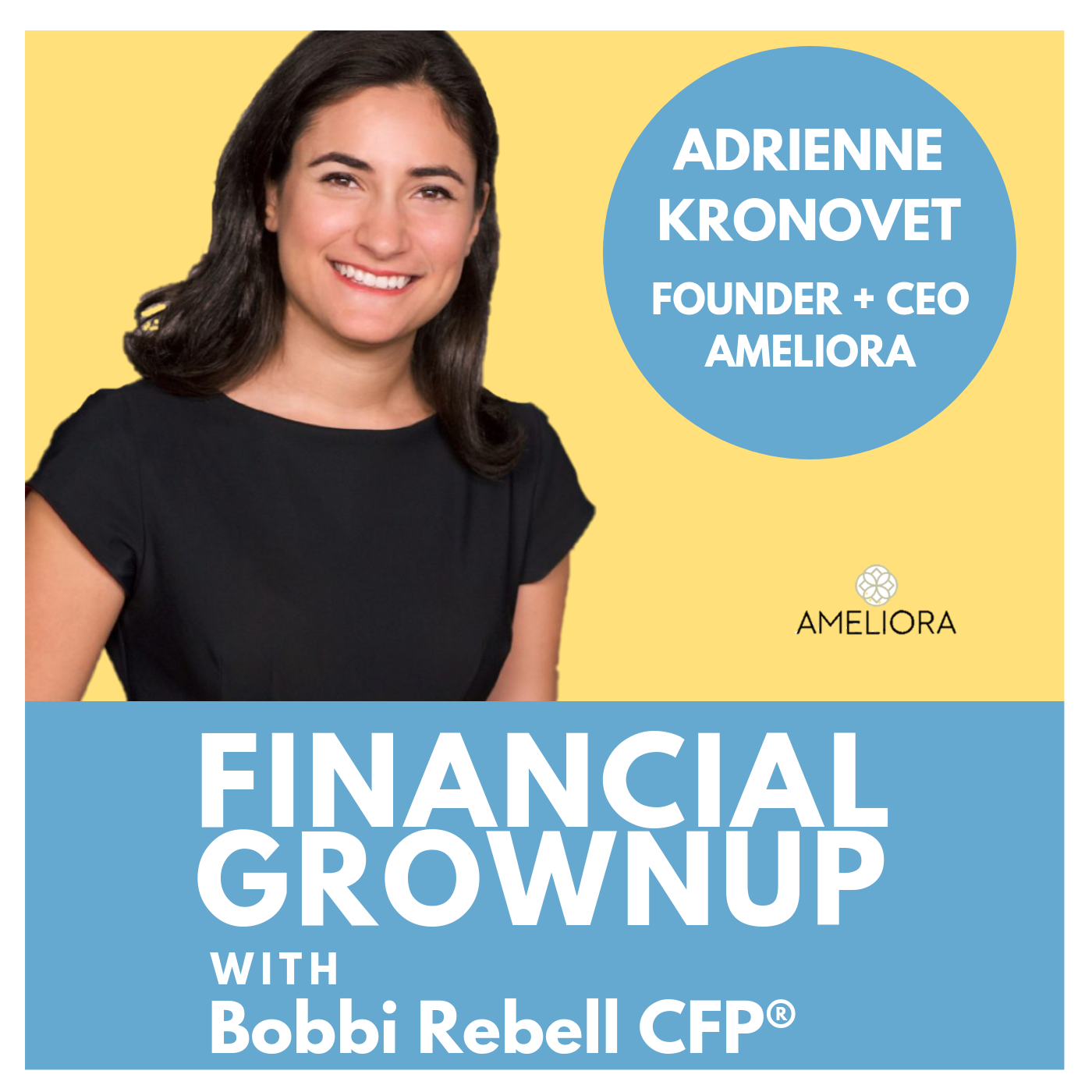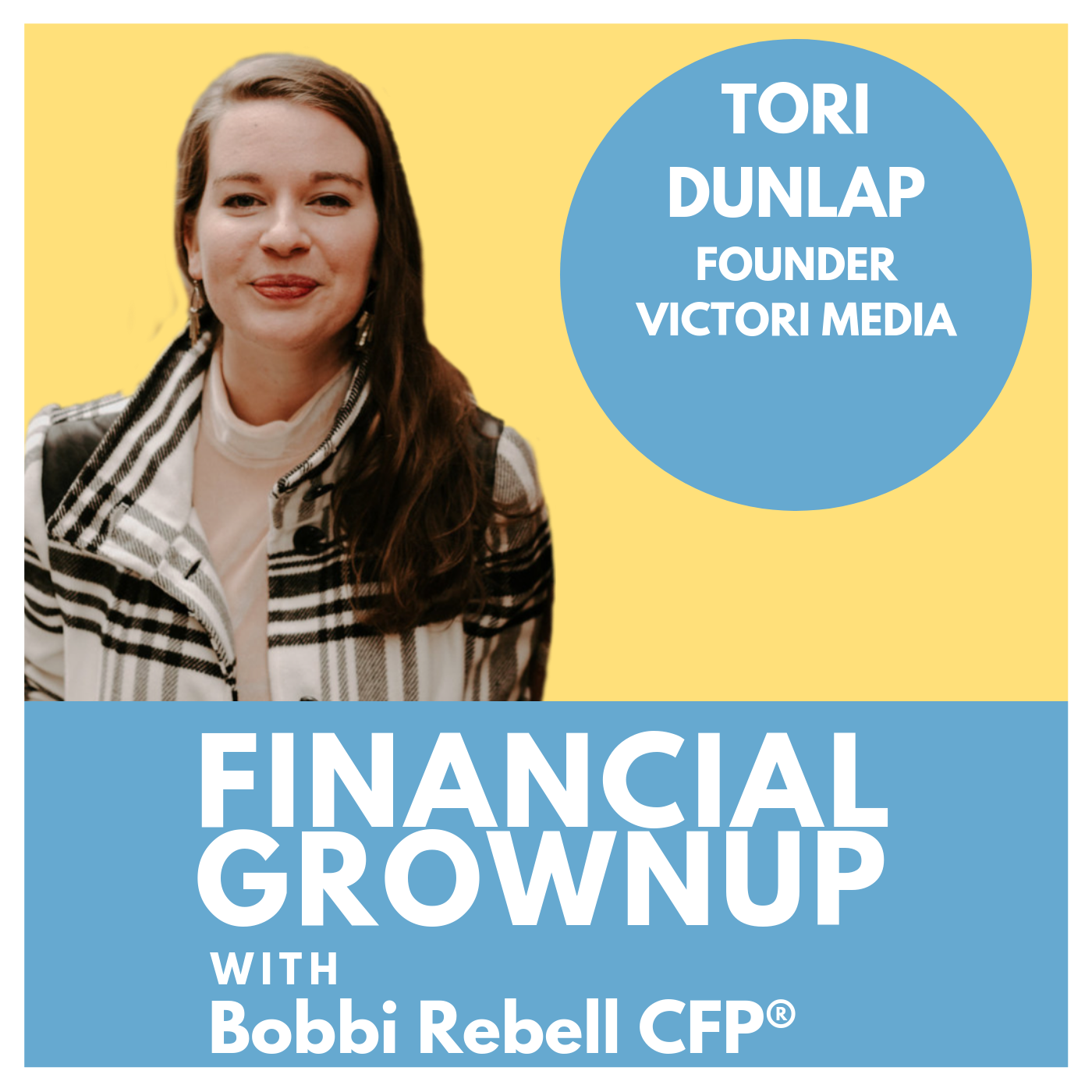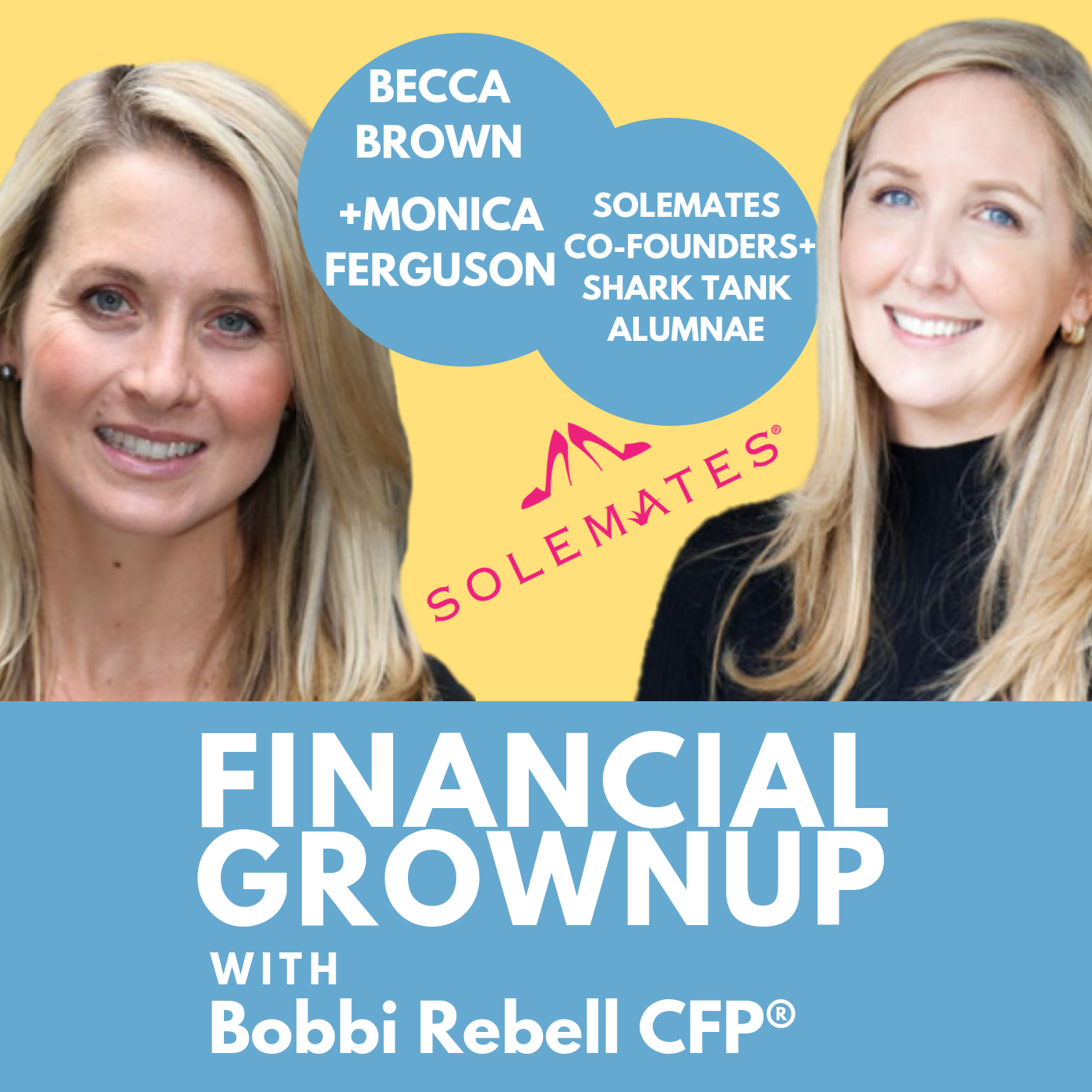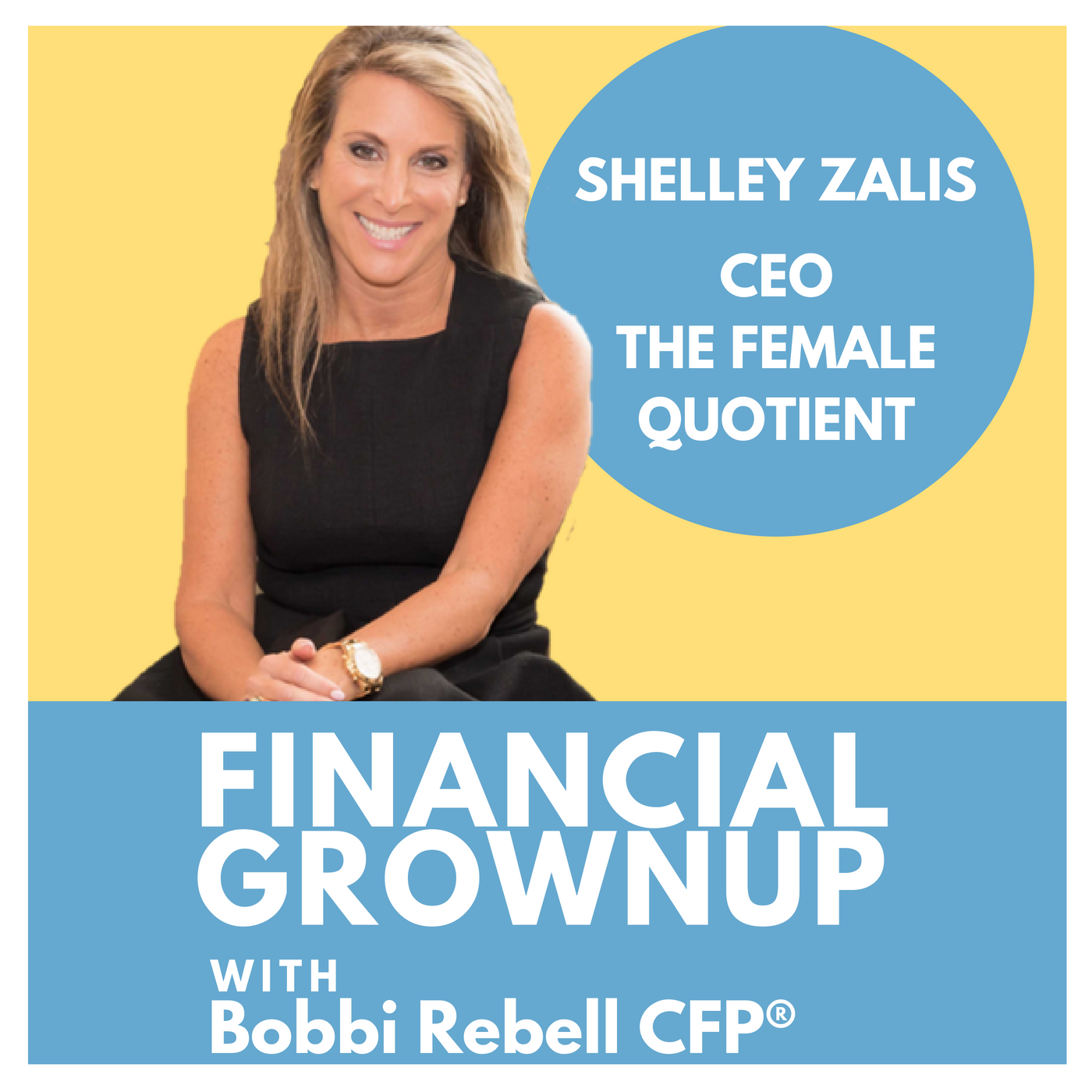Transcription
Lyss Stern:
They wrote back to me, "But we can pay you in craisins," and that was it for me. That day, I'll never forget. I could not believe what I was reading in front of me. They had the nerve to tell me that they could pay me in craisins.
Bobbi R.:
You're listening to Financial Grownup With Me, certified financial planner, Bobbi Rebell, author of How To Be A Financial Grownup, and you know what? Being a grown-up is really hard, especially when it comes to money, but it's okay. We're going to get there together. I'm going to bring you one money story from a financial grownup, one lesson and then my take on how you can make it your own. We got this.
Bobbi R.:
Hey, financial grownup friends, so this episode is going to give us permission to push back a little or actually a lot when we don't get what we need to run a profitable business. Emphasis on profit. Mompreneur, Lyss Stern, is the CEO of the networking and event planning company, DivaMoms. There are a number of them out there, but she was really a pioneer and helped create and define an industry that is thriving. And since she has so much free time, not while raising her three kids, she also writes books.
Bobbi R.:
You may have heard of If You Give a Mom a Martini and her more recent hit Motherhood is a B: 10 Steps to Regaining Your Sanity, Sexiness, and Inner Diva, which she co-wrote with Cheryl Burke, and it has a forward by odd-mom-out star, Jill Kargman. Special welcome to our new listeners. We keep the shows short, about 15 minutes so that we can fit it into your busy day, but we also do three a week, so we hear a lot of listeners like to binge listen on, for example, longer commutes. Think of it like flex-time for podcast listening. Hit subscribe if you have not already, and be sure to set up automatic downloads, so you have one less thing to remember. Just like you should automate your savings. One less thing. Okay, now let's get to the fantastic, Lyss Stern, who runs a for-profit business, something potential clients seem to have a hard time fully understanding. Here is Lyss Stern.
Bobbi R.:
Hey, Lyss Stern, you're a financial grownup, welcome to the podcast.
Lyss Stern:
Thank you for having me.
Bobbi R.:
And I am such a fan of your company Divalysscious Moms, major event planning company. I mean literally, you have millions of mothers and Mompreneurs in your universe that you have coming to your incredible events. So I'm over the moon that you were able to make time to chat with us. So thank you for being here.
Lyss Stern:
Of course. Thank you for having me on. I'm so excited to be talking with you.
Bobbi R.:
Before we get to your money story, just tell us a little bit about the company.
Lyss Stern:
Sure. So DivaMoms is a lifestyle company for moms everywhere. What we do is we bring the best of the best directly to the moms. We've really become a direct marketing company, so we work with whatever is new, fabulous for moms, for kids, but everything has to be approved by DivaMoms, by Lyss Stern herself, before we promote it to our moms and our community.
Lyss Stern:
And we throw these amazing events and we have DivaMoms book clubs and lots of fabulous parties where moms can come and just be, let their hair down, have fun, mix and mingle with other fabulous moms and really a great social network for moms everywhere. A really amazing community online and offline.
Bobbi R.:
And you're also an author. We're going to talk about your books, in a couple of minutes, but first I want to get to your money story, because you're talking about your business, and it's really important for people to hear a little bit of the behind-the-scenes of what goes on behind these events, and the kind of decisions that you have to make in running a successful business. Tell us your money story.
Lyss Stern:
Sure. So my money story is that I get hundreds and hundreds of emails a day, as I'm sure many Mompreneurs do, where companies want to work with me. They want to advertise with DivaMoms. They want to sponsor DivaMoms events. They want social media, They want email blasts, you name it. They want it.
Bobbi R.:
So there was one company that approached you and this was not a startup. What specifically did they approach you about doing with them as a business?
Lyss Stern:
Sure. So this one company, in particular, that is a billion dollar business.
Bobbi R.:
A food company?
Lyss Stern:
A food company, billion dollars.
Bobbi R.:
A company we've all heard of?
Lyss Stern:
Yes, oh yes. Reached out to me and said, "We love DivaMoms. We want to work with you, we want to advertise with you. We want to sponsor some of your events. We want to do direct marketing with you, want to do social media with you. We want email blast with you," all this other fabulous stuff. Okay, great. So I write back and "Thank you for reaching out. Let's talk, when you have some time, about what your budget may be," and all this other stuff.
Lyss Stern:
And they write back to me, "Oh no, no, no, no, no. We don't have a budget. We don't have a marketing or advertising budget." No, but I see their advertisements on every billboard, on every bus.
Bobbi R.:
Well they don't have a budget for you.
Lyss Stern:
But they don't have a budget for me. Correct.
Bobbi R.:
And they came to you?
Lyss Stern:
Yes. I did not approach them, and they can come directly to me. I wrote back something very polite and then they wrote back to me, "Oh no, no, no, no, no, but we can't pay you," because I guess they got, they understood where I was coming from, that this DivaMoms is a for-profit business. Yes, we are affiliated. We work with different charities that we're passionate about, but DivaMoms is not a charity, we're a for-profit business like everybody else like they are.
Lyss Stern:
And they wrote back to me, "But we can pay you in craisins," and that was it for me. That day, I'll never forget. I could not believe what I was reading in front of me. They had the nerve to tell me that they could pay me in craisins. And ladies and everybody out there know your worth, and you know that you are better at getting paid in craisins.
Bobbi R.:
Oh, my goodness. Tell me how you would, in another situation, how can you turn around that kind of approach to something that is paying you in money? Have you had any stories where you've been able to make the pivot and get someone to see the value and then actually pay you in a currency?
Lyss Stern:
Yes. So I've had this many a times and this was the one time, obviously, that was with the craisins, and it was just ridiculous. But a lot of times I will write back to companies that reach out to me, and I'll explain to them who we ... Sometimes I don't think they really understand what I am or what we do. They might think that I'm, I don't know what they might think, maybe it's just a hobby for Lyss Stern. Maybe this is a hobby DivaMoms, this is not a business, and I make it, it's all business.
Lyss Stern:
This is what it is. It's very black and white and I send them, obviously, information. I send them photos, I send them videos, I send them press links and let them know who I really am. And then a lot of the times they do come back, and they say, "Oh, I didn't realize," and, "I didn't know that you did this and this and this. Let me go back and see if we can find some money in the budget." And a lot of the times they do go back, and they do, miraculously somewhere, find money out of their budget to work with us.
Bobbi R.:
So what is the lesson for our listeners to get more situations like scenario number two rather than number one?
Lyss Stern:
Sure. My mom always taught me, and I'm sure we get everybody's heard this a million times, "You get more with sugar, so always be sweet." Always put your best self out there and hopefully they will come back and understand. That you, obviously, that you have a business that you have worth. And it's always nicer to respond with a nice email and/or pick up the phone and set up a time to call and explain yourself. Explain what the business is, who you are, what you actually really do. And if they don't understand, no worries, no problem. But, hopefully, after speaking to you, after really going through your email and going through your information and doing their due diligence. They'll come back and say, "Okay, we found money," or "We'd like to really work with you and this is what we're going to do and this is what we can do."
Lyss Stern:
And I also always, I think it's important too, to give companies options to say, "What is your budget? What are you looking to do? Because we could start at this, and we can go to this." But it depends on again, what every company's looking for. And I just think it's there from the beginning, from day one of the conversation to be open and hat in hand and to have that conversation. And that's just even an example of a few days ago, a company reached out to me, a clothing company. They want me to host an event for them and Dah, Dah, Dah. And she starting to getting into this whole conversation about where the event was going to be. And I said, "Before we even begin this conversation, I just have to tell you we charge and this is what we do and this is-
Lyss Stern:
And she's, "Oh well, oh, I didn't know, I didn't know that you ... and so I had to explain it and then I sent her a proposal and that's also important too. Write it out, a, b, c, bullet point, make it visual and show them what you do, and then hopefully they'll come back with a budget.
Bobbi R.:
And I like the way that you phrase that, because what you're doing is you're giving people the benefit of the doubt. That they may think, on the surface, not fully understand your business, that they're in fact helping you give you exposure, give you new contacts, that kind of thing when in fact, as you said, you do need to be compensated, because this is the business. And I think that's something that people can sometimes get lost in, and they are well intentioned. You can't necessarily come back with negativity.
Lyss Stern:
Absolutely. I think that if you come back with negativity, at least from the beginning, from right on, it's not going to get you anywhere, but sometimes they really might not understand what you are, who your business is and what you really do. So just again, send an email, really show them what you do or set up a phone call with them or even have a meeting, go for coffee, have a lunch meeting and be a person and talk about what you do. So I think that they get a better understanding and then hopefully they can wrap their head around it and see the value and see the worth. And I think that's really important.
Bobbi R.:
Do you try to let them say the number first in terms of budget?
Lyss Stern:
I do. A lot of times I'll say to the company, "What are you looking to do? What is your budget?" And a lot of times they'll come back to me, and they'll say, "Well, what can you do for this amount? What can you do for that amount?" And sometimes they'll say to me, "Well, I don't really know, so can you give me a breakdown of what things cost?" Which I'll do always. I think a lot of times a lot of companies today don't pay, because they don't have to, because a lot of times people or companies or influencers might do stuff for free, which is fine and great. Or they might do stuff for products, I mean whatever that's wonderful. But we, my company, happens to be a for-profit business, so I just need to make that clear from early on.
Bobbi R.:
All right, let's move on to your everyday money tip, because this one made me really happy. Tell us.
Lyss Stern:
Okay. I have three children, and we love to go for ice cream. However, there is a great way to save money for ice cream. For us as adults, they always do offer kiddie cups and kiddie cones. They might not show it out on the counters-
Bobbi R.:
And they don't always tell you, which is tricky with the kids. You have to be proactive, because your kids are going to see the bigger sizes.
Lyss Stern:
Yes. You have to be proactive. You have to ask, they most usually do not put the kiddie cone, or the Kiddie cup out there, especially during the summertime, their busiest time. And same thing for going for a ladies lunch. A lot of times you don't have to order the whole salad. You could ask for half a salad, and it also affects the cost, obviously. They're just little tips about food that you can, obviously, save a few dollars by asking and being proactive.
Bobbi R.:
Always order the small or even just order an appetizer. If you're super hungry, of course, eat what you want to eat, but if you're really just there to spend time with your friends, and the food is kind of an afterthought. Don't feel you have to order an appetizer, a drink, a full entrée, a dessert, a coffee, tea.
Lyss Stern:
No, it's definitely not necessary.
Bobbi R.:
All right. I want to talk about your books, because in addition to this big business that you re running you're also churning out some books. So your first book was If You Give a Mom a Martini, which I loved. I remember reading that. A 100 ways to find 10 blissful minutes for yourself. We all need that. And, by the way, it applies to dads too, okay.
Lyss Stern:
Yes, it does.
Bobbi R.:
And then your latest one is Motherhood is a B, 10 Steps to Regaining Your Sanity, Sexiness and Inner Diva, which is a great summer read. Tell us a little bit more about that.
Lyss Stern:
Sure. So this book was created, because I felt, after having three kids, that I was just on the verge of losing it, losing myself actually. I wasn't feeling well. I was just in a place, my father just passed away, and I remember going to a retreat by myself for a few days. I said to my husband, "I just need to go away for a few days." I went to a retreat, and I remember coming back from that retreat and saying, "I need to start taking care of myself. I need to start putting myself first, because if mom's not happy, kids aren't going to be happy." Motherhood is really hard. I don't think that anybody tells you, there are no parenting books out there that really tell you what motherhood is.
Lyss Stern:
Everyone, sometimes they paint pictures of that it's rainbows and roses and Unicorns every day and it's happiness, and it's ... but it's really hard being a parent, and I think that the book is all about really empowering you to step back and get yourself back. It's like almost like a Stella Got Her Groove Back, right.
Bobbi R.:
When feel like someone gets you.
Lyss Stern:
Yes. And that's really what the book is about, and it's a great beach read, and you could have conversations with your friends and don't forget to have a B-Tini on the beach as well, because we have the recipe in there. It's absolutely delicious, with watermelon juice, and it's just again, taking care of you and putting your foot down and learning to say no and really regaining your inner-B, because motherhood is a B.
Bobbi R.:
All right. Tell us more about where people can find you and learn more about you, DivaMoms, your books, all that good stuff.
Lyss Stern:
Sure. So everybody can find me. The best place to find me is on Instagram, which is diva D-I-V-A _ moms M-O-M-S. And you can also find me on Twitter, which is divamoms.com, and of course my website, which is divamoms.com and also on Facebook. I'm very active on Facebook.
Bobbi R.:
You're everywhere.
Lyss Stern:
We have a Divalysscious Moms pages, but we also have a Lyss Stern page where I post a lot of stuff too, and also everybody listening, I'm a little sarcastic online, and I'm a little bit funny I'm a little bit witty, and I'm very real and what you see is what you get.
Bobbi R.:
Which is awesome.
Lyss Stern:
Thank you.
Bobbi R.:
Okay, friends. So the most upsetting thing about Liz's story is that while the whole craisins thing with the currency was pretty unbelievable, the idea that potential clients will try to convince you that they have no money is not unusual, especially when it comes to Mompreneurs. Let's face it. So Financial Grownup tip number one, every time you take on a client that pays you a low market or less than you want or need, the time that you used to work for that client is time you are not using to find better paying-work or to do better-paying work. So for example, let's say Lyss decided to work on a client that paid her 20% below what she needed to make a profit, because well, it was better than nothing and maybe she didn't have something else at the time, when that offer came in, those days are locked in.
Bobbi R.:
Okay, so now another potential client comes along, and we'll meet her price, but now she's not available. Don't work with clients who either cannot afford to pay you at the rate that you need to hit your profit targets, and especially don't work with clients that have the resources to pay you appropriately, but choose to try to low ball you.
Bobbi R.:
Financial Grownup tip number two, but here is the caveat to what I just said. If there is a client that, in the short term, cannot afford to pay you in currency, as I joked with Lyss, but you believe they will add value for your brand in a constructive way, it is okay to try to work something out. Don't be stubborn. Not every case is black and white. Live in the gray areas, just not in the red, of course.
Bobbi R.:
Thanks for sharing this time with us. Tell us your Financial Grownup money tips, DM me on the social channels @bobbirebell1 on Instagram, @bobbirebell on twitter, and learn more about the show at bobbirebell.com/financialgrownupspodcast. Lyss Stern does not mess around. She is definitely a Financial Grownup, so thanks, Lyss, for helping us all get one step closer to being Financial Grownups.
Bobbi R.:
Financial Grownup with Bobbi Rebell is edited and produced by Steve Stewart and is a BRK Media production.












































